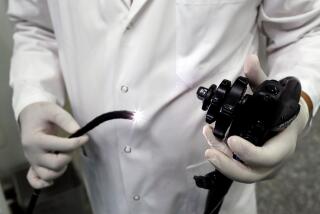PSA tests, mammograms and other cancer screening tests can be hard to give up, researchers find
- Share via
If you had an advanced case of pancreatic cancer, would you still schedule a routine colonoscopy? If you were suffering with stage IV lung cancer, would you still get a PSA test? If you were battling stage IV breast cancer, would you ask your gynecologist to do a Pap test?
For many patients, the surprising answer is yes.
Researchers from Memorial Sloan-Kettering Cancer Center in New York and the Dana-Farber Cancer Institute in Boston examined the medical records of 87,736 Medicare patients who had been diagnosed with advanced cancers. These were patients who didn’t have long to live – only 15.5% of them survived for five years after being diagnosed. The median survival times ranged from 4.3 months for those with pancreatic cancer to 16.2 months for those with breast cancer.
Their severely reduced life expectancies made them poor candidates for cancer screening tests. “They have essentially no chance of benefiting from these procedures,” the researchers explained in their study, which will be published in the Journal of the American Medical Assn. on Wednesday.
And yet, 9% of the women with advanced cancer got mammograms and 6% got Pap tests, while 15% of men had PSA tests. Two percent of the patients even had colonoscopies. In fact, the patients with advanced cancer got 35% to 55% as many screening tests as cancer-free Medicare patients who were matched based on age, gender and race, according to the study.
How could this happen? Perhaps doctors had not been clear with patients about their limited prognoses, so they didn’t realize the tests were superfluous. Maybe they had been told but were in denial and got the tests “as a coping strategy,” the researchers suggested. Or maybe patients and their physicians were simply on autopilot.
Whatever the explanation, these tests would seem to be a “clear and compelling” example of “wasteful” healthcare spending, the authors conclude. But it’s not the most egregious example of unnecessary cancer screening: the authors cited a 2004 JAMA study that found that half of all women who had hysterectomies continued to get Pap tests to check for cervical cancer – even though their cervixes had been removed.
-- Karen Kaplan/Los Angeles Times






